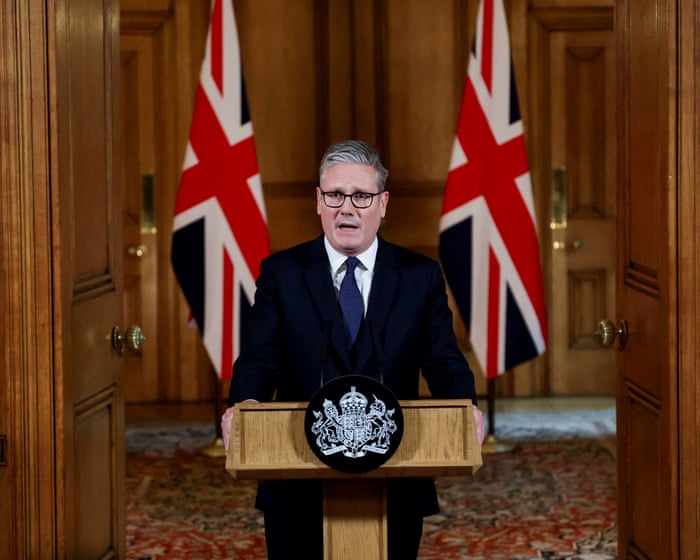The UK plans to formally recognize Palestine as a state this September due to the worsening crisis in Gaza, unless Israel agrees to a ceasefire and commits to a two-state solution.
Prime Minister Keir Starmer’s cabinet has approved a peace plan after facing growing pressure at home over Gaza’s humanitarian disaster and calls to follow France in recognizing Palestinian statehood.
Starmer recalled ministers from their summer break to finalize the plan following discussions with US President Donald Trump in Scotland. Trump said the issue hadn’t been raised but that he didn’t object to the UK taking its own stance.
Starmer told his ministers that with Gaza’s catastrophic conditions and fading hopes for a two-state solution, now was the time to act.
“The only way to end this crisis is through a lasting settlement,” he said. “Our goal remains a secure Israel alongside a sovereign Palestine, but that vision is under unprecedented threat.”
He added: “We’ve always said recognition should come at the right moment to support peace. With the two-state solution at risk, that moment is now.”
UN experts warn of famine in Gaza, with the World Food Programme calling it the worst hunger crisis this century, comparable to past famines in Ethiopia and Biafra. Israel denies causing famine.
Gaza’s health ministry reports over 60,000 deaths from Israeli attacks, nearly half women and children. Israel has restricted aid for much of the 22-month war, at times blocking it entirely. Current shipments remain insufficient, with only half of requested aid reaching Gaza despite recent eased restrictions.
The UK’s new approach means recognition will happen at September’s UN General Assembly unless Israel meets conditions in an eight-point peace plan backed by allies. These include ending Gaza’s crisis, agreeing to a ceasefire, halting West Bank annexation, and committing to long-term peace. Starmer spoke with Israeli Prime Minister Benjamin Netanyahu before the announcement.
Israel’s foreign ministry rejected the move, calling it a “reward for Hamas” that undermines ceasefire efforts. Netanyahu accused Starmer of endorsing terrorism, warning a Palestinian state would threaten both Israel and Britain.
The UK also reiterated demands for Hamas to release hostages, disarm, accept a ceasefire, and stay out of Gaza’s governance.
“We’ll assess progress in September, but no party can veto our decision,” Starmer said.
However, the Liberal Democrats and Greens criticized using statehood as leverage, arguing recognition should happen immediately.The UK has decided to recognize Palestine immediately. This move follows an agreement between UK Prime Minister Keir Starmer, French President Emmanuel Macron, and German Chancellor Friedrich Merz to work toward “lasting peace” in the region during talks over the weekend. Starmer planned to discuss the decision with allies, including Gulf states, on Tuesday evening.
During discussions in Scotland on Monday, former US President Donald Trump removed a major obstacle to UK recognition by signaling that the US—one of Israel’s strongest supporters—would not oppose the move. Trump also expressed concern over images of starving children in Gaza.
However, a US State Department spokesperson criticized Starmer’s announcement on Tuesday evening, calling it a “slap in the face for the victims of October 7.” Tammy Bruce stated, “It gives one group hope, and that’s Hamas. It rewards that kind of behavior,” adding that Hamas benefits from the horrific images emerging from Gaza.
Downing Street has maintained that recognizing Palestine was a matter of “when, not if,” as public opinion in the UK has shifted due to the worsening humanitarian crisis. A Survation poll shows that Britons support recognition by more than three to one, with 49% in favor and only 13% opposed. The same poll indicates that nearly five times as many people want the government to take a stronger stance against Israel’s actions in Gaza.
Starmer explained that the dire humanitarian situation, which is “getting worse by the day,” along with fading prospects for a two-state solution, prompted the decision. The UK has recently collaborated with Jordan to airdrop 20 tonnes of aid into Gaza.
“We’ve been saying for some time that aid must arrive faster and in greater quantities. The situation is now catastrophic, which is why I’ve taken this step today regarding the two-state solution and recognizing Palestine,” Starmer said.
Last week, The Guardian reported that Starmer faced pressure from cabinet ministers to recognize Palestine immediately, joining nearly 140 other countries amid global outrage over Israel’s attacks on starving civilians in Gaza. Deputy Prime Minister Angela Rayner, Home Secretary Yvette Cooper, and Health Secretary Wes Streeting were among those pushing for recognition, along with over a third of Labour MPs who signed a letter supporting the move.
At the UN, Foreign Secretary David Lammy stated that the UK hopes its decision will influence the situation in Gaza over the next eight weeks. He emphasized the UK’s “special burden of responsibility” to support a two-state solution, given its historical role in backing a Jewish state in Palestine in 1917.
“The Netanyahu government’s rejection of a two-state solution is wrong—morally and strategically. It harms Israel’s interests and blocks the only path to a just and lasting peace,” Lammy said.



